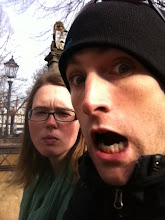I attempt to be intellectual 2.0... AND positive
Ken Morgan spoke in the final session of the Conference and had a number of helpful thoughts. He spoke of a “Gap” between the "Source" (ie the Bible/biblical culture) and what he called the “Receptor culture” or (what we call normal everyday Australian society and culture). He mentioned that traditionally we have relied too much on “Language” as the model for communicating across this “Gap” (eg. classical walk up evangelism).
He added two different methods for the communication of the “Source” across the “Gap”. The first of these was through "Behavior". In other words looking at the way be behave and act as Christians personally as "Missional" and a way of communicating the “Source” to the non Christian.
Secondly through having a Christian "Counter Culture" where Christians seek to engage actively with the community and culture. Bringing the implications of the gospel to bear on a wide variety of topics, not in a moralistic and often unhelpful way (eg. Fred Nile on abortion and homosexuality) but in an intelligent articulate and holistic way. The end point being the non Christian understanding a holistic Christian world view rather than bunch of dos and don'ts coupled with self righteous piety.
I think at Crossroads early on we over emphasized the “Language” approach, not seeing other ways of communicating as valuable rather as weak and lacking. This was something that we corrected over time and was addressed in one form or another in the Hullabaloo.
I wholeheartedly agree that “Behavior” and “Christian Counter Culture” are vitally important in the communication of the “Source”. However I affirm the importance of the traditional “Language” approach as well. I think for evangelism and “Mission” to work you need all three working together. (I felt this was implicit in what Ken was saying rather than explicit). One book I found personally helpful in doing this was John Dickson’s Promoting the Gospel. He advocates a holistic approach to evangelism which I found a useful corrective to my thinking.
Ken Morgan also advocated a new missionary method which I also found helpful. He stated we need to
Listen to out culture first before seeking to engage it.
Look for opportunities to serve our culture eg. help people out etc
Celebrate or show our community the reasons we have for hope we have.
He added two different methods for the communication of the “Source” across the “Gap”. The first of these was through "Behavior". In other words looking at the way be behave and act as Christians personally as "Missional" and a way of communicating the “Source” to the non Christian.
Secondly through having a Christian "Counter Culture" where Christians seek to engage actively with the community and culture. Bringing the implications of the gospel to bear on a wide variety of topics, not in a moralistic and often unhelpful way (eg. Fred Nile on abortion and homosexuality) but in an intelligent articulate and holistic way. The end point being the non Christian understanding a holistic Christian world view rather than bunch of dos and don'ts coupled with self righteous piety.
I think at Crossroads early on we over emphasized the “Language” approach, not seeing other ways of communicating as valuable rather as weak and lacking. This was something that we corrected over time and was addressed in one form or another in the Hullabaloo.
I wholeheartedly agree that “Behavior” and “Christian Counter Culture” are vitally important in the communication of the “Source”. However I affirm the importance of the traditional “Language” approach as well. I think for evangelism and “Mission” to work you need all three working together. (I felt this was implicit in what Ken was saying rather than explicit). One book I found personally helpful in doing this was John Dickson’s Promoting the Gospel. He advocates a holistic approach to evangelism which I found a useful corrective to my thinking.
Ken Morgan also advocated a new missionary method which I also found helpful. He stated we need to
Listen to out culture first before seeking to engage it.
Look for opportunities to serve our culture eg. help people out etc
Celebrate or show our community the reasons we have for hope we have.



0 Comments:
Post a Comment
<< Home